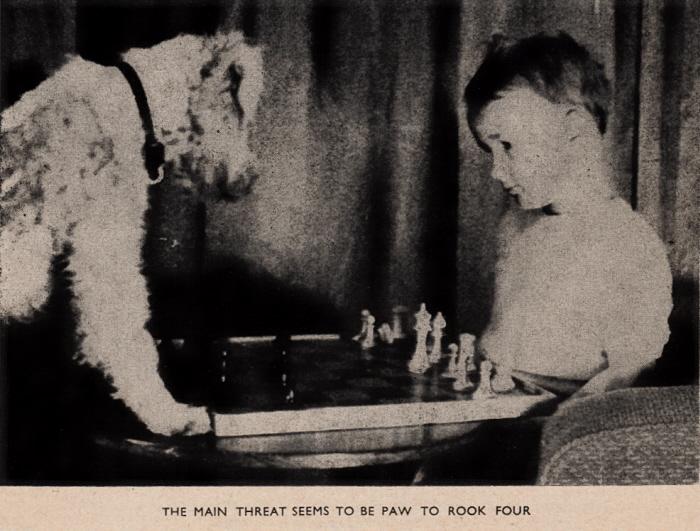
Edward Winter

CHESS, February 1948, page 117
The handiwork of some of the chess world’s vapidest punsters and gagsters is exhibited here, beginning with an item from Chess Notes in 1986.
An article about the eight-year-old chessplayer George William Woolf on pages 414-415 of the October 1901 BCM stated:
‘He is a vivacious and studious boy, and is to be credited with this witticism; that when I once asked him whether he would ride on a tram or a bus he selected the bus, saying, “A tram is always in check, but a bus can move where it likes”.’
Nobody could have guessed that, 85 years later, adults would be making puns of no better quality in Chess Life.
(1171)
Two chess enthusiasts in a tea-shop, playing for a shilling. They are joined by a man who constantly offers advice and observes, ‘I didn’t expect to find you chaps playing for filthy lucre’. One of the players replies, ‘It isn’t the filthy lucre we object to; it’s the filthy looker-on.’
Source: American Chess Bulletin, October 1913, page 236.
(Kingpin, 1998)
Jim Hayes (Kilkenny, Ireland) points out that the ‘looker-on’ joke was published by Bird on page 119 of his book Chess History and Reminiscences (London, 1893). Bird gave the punch-line as being his reply to Boden. The quip has also been attributed to Blackburne; see CHESS, January 1952, page 79 (and Chess Review, March 1951, page 82).
The next page of Bird’s book has more Victorian merriment:
‘Boden and Bird were favourite opponents for 25 years and though very opposite in styles were, in the long run, singularly even in their series. It was the practice of both to resign at the proper moment. Bird, once it was thought, gave up too early. “Oh, it is hopeless,” said he, “I have my misgivings, I cannot contend against such forebodings, one Boden is too much for me.’
During its three-issue run from January to March 1865, the Household Chess Magazine inflicted such quips as:
‘Why is the ex-director of the Liverpool and Cornwall Insurance Co. like the Bishop I have just taken with my Queen? Because he is removed from the board.’
‘When may a lady playing at chess be said to commit an indiscretion? When she stops the (K)night with a Bishop, having engaged to mate her opponent.’
‘Why is a lean monarch like a man meditating? Because he is a thin-king.’
Then there was the Lynn News of 28 December 1858, which quoted from the American Union:
‘MR EDITOR:- Why ought the problems of W. King, of New York, to be rejected as spurious? Because they are alloyed (ALL-LOYD). Why will a certain distinguished player of the Boston Chess Club always enjoy better health than yourself? Because, no matter how well you may be, he will invariably be WELLER. Why are these conundrums like a boiled dinner? Because the one goes “to pot” while the others go to POTTER.
I know the above are rather personal; but then, if anyone complains that the UNION is too full of such jests, “jess” tell ’em that “Frank Leslie’s” column used to be FULLER. Such an answer will be fully up to the proper “Standard”, and in perfect accordance with the “Spirit of the Times”. Should your grumbler show fight, and “hit you a clip”, you may, with perfect propriety, return him a “Clipper” and thus “Dispatch” him. Having “Delta” finishing stroke, you may retire and “wake up famous”; for, in our “Republican” or “Albion” lands, such “News” is sure to reach the “Press”; and, in the “Bulletin”, you will find yourself regularly “Gazette”-d ere you will have time to say JACK ROBINSON.
[We overlook the personalities, just or unjust, and feel much be-Holden to you for your Weller-ism and King-ly jokes. Can’t you Cook up some Moore? –J.A.P.]’
(Kingpin, 1999)
We can now add that the ‘looker-on’ joke had already appeared on page 131 of G.A. MacDonnell’s Chess Life-Pictures, a book published in 1883, without any mention of Boden.
Page 136 of that work offers another example of what made Victorian waistcoats heave with mirth:
‘A few days ago I entered the room where this same youth was battling with another boy of considerable reputation as a player. “Well, Charles”, asked I “how are you getting on with your game?” “Oh!” replied he, “the game could not be better; I have a clear piece ahead.” “Don’t you think”, rejoined I, “it would be better if you had a clear head a piece?”’
(Kingpin, 2000)
Some more nineteenth-century puns, dredged up from page 255 of the August 1860 issue of the Fiske/Morphy magazine, the Chess Monthly:
‘Easy Questions for Chess Amateurs. Why is a player, who has lost all his pieces, like a policeman?
Because he is out o’nights (out of Knights.)When is your adversary’s Pawn like a cow?
When it has pastures (past yours.)Why is The Chess Monthly like a coffin?
Because it has a Paul on its cover.Why do some players twirl their pieces on the squares, as if they wished to screw them into the board?
Don’t know. Their motives are in-screw-table (inscrutable.)’
Chess magazines have even been known to publish jokes which have no detectable link to the royal game. An example comes from page 121 of the January 1908 Chess Amateur:
‘Q. What is Australia bounded by?
A. The Kangaroo.’
(Kingpin, 2000)
Below are two scintillating items culled from the 2002 Bled Olympiad bulletins.
‘A professional chess master goes to the doctor for the results of tests.
Doctor: “I’ll be straight with you, you’ll live for two to three more months.”
Professional master: “That’s easy to say, but than whom?”’
Another timeless knee-slapper honed by a master story-teller:
‘Two chess friends meet again after a long time. The first asks the second what’s new since they last met … The second answers that he recently married his former secondary schoolmate … The first considers and then says that the wife’s mother probably doesn’t know how to play chess!? The second answers in surprise that it’s true, she doesn’t, but why’s that at all important …? And the first answers: “Well, what chess player would swop a queen for a knight?”’
(2814)
A characteristically dire nineteenth-century space-filler (published in the Kentucky State Journal and reproduced on page 104 of the Columbia Chess Chronicle, 15 November 1889):
‘While most of the professionals advocate the “modern school” they all believe in the more-fee system.’
(3279)
Once a year a special dispensation allows us to cite a few nineteenth-century chess puns, adding to the offscourings already showcased in previous items. Neil Brennen (Malvern, PA, USA) uses up our 2004 quota by drawing attention to the Philadelphia Evening Bulletin chess column of 4 August 1860. Our correspondent writes:
‘After quoting some awful “linguicide”, to use the Bulletin’s description, from the Chess Monthly, the Bulletin added the following “Anglo-torture” as its contribution to chess punning:
“Who invented chess?
The Pawn-ee.”“Why did they invent it?
To show their Injin-uity.”“When is a lawyer, opening a letter, like a successful chessplayer?
When he discovers a check for more fee.”“When is a Knight like a fish?
When it’s guarding its spawn.”Fortunately, there were only these four ...’
The third of them anticipates by decades the ‘more-fee’ quip joylessly cited in C.N. 3279 above.
A markedly lame batch of ‘Chess Conundrums on the War’ by J.A.M. Osborn appeared on page 193 of the Chess Amateur, April 1917. One of them (and not even the worst) will suffice here:
‘What pieces are favoured by the Teutons for making “Zep” raids?
The (K)nights.’
Puns are certainly less frequent in chess writing today, although Chess for Winners by William E. Davis, Jr. (New York, 2002) bucked the trend. To go no further than the Table of Contents (and we did not), two specimens proffered by Mr Davis are ‘The Pin is Miterier Than the Sword’ and ‘Ob-Skewer Your Opponent’s Vision’. Of course, many chess writers nowadays indulge in bleak, seen-a-thousand-times wit-substitute like ‘The Great Dane’ to describe Bent Larsen.
(3337)
From page 3 of CHESS, 14 September 1937:
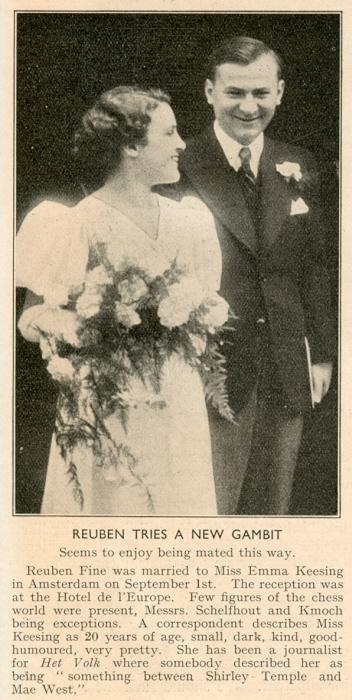
(7136)
Lame puns on players’ names are depressingly commonplace (they require no skill, knowledge, wit or thought), but we remain intrigued by a remark, whether or not intentional, in an obituary published on pages 166-167 of the April 1931 BCM:
‘He has probably conceded more drawn games when having a positional advantage than any other chess player.’
As mentioned on page 387 of Kings, Commoners and Knaves, the obituary was of J.A.J. Drewitt.
(7823)
Alekhine’s brilliancy against Drewitt at Portsmouth, 1923 had this introduction on page 4 of the Cheltenham Chronicle, 22 September 1923:
‘Alekhine’s opponent, Drewitt, did not draw it.’
A remark which we jotted down at the time from Clive James’ television column in The Observer, 9 July 1978, page 23:
‘The chief characteristic of people without a sense of humour is that they will laugh at anything.’
The following by Roger J. Wright may be noted from page 48 of the (hors série) Christmas 1893 issue of the BCM:
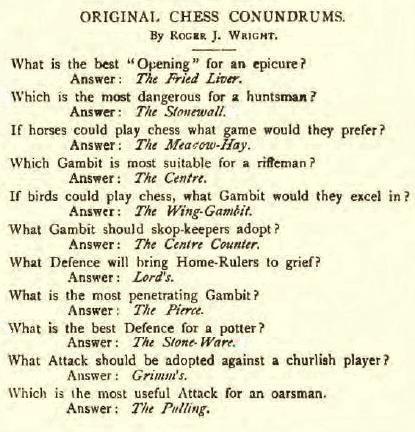
Such material is likely to have generated few chuckles even during Christmas 1893.
(8069)
Below is how the Columbia Chess Chronicle decided to waste page 244 of its 24 December 1887 issue:
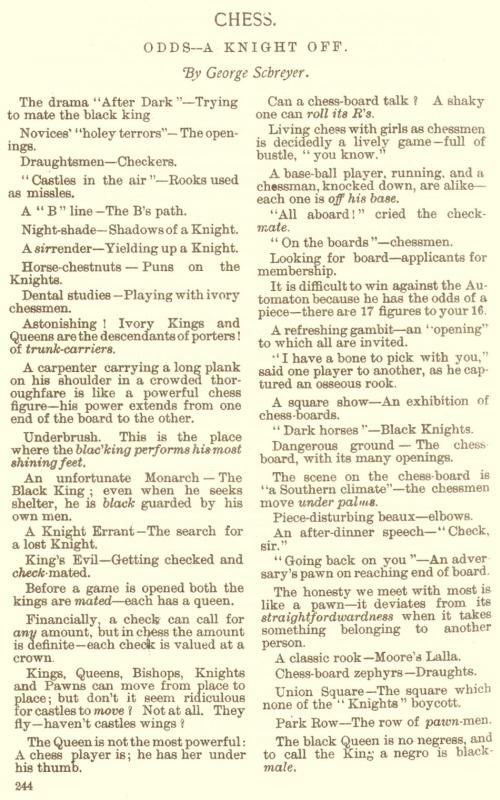
From page 42 of the Sunday Times, 13 June 1976:
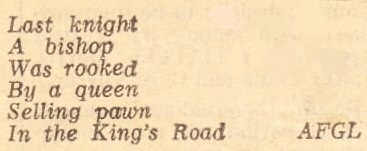
Further embarrassment:
‘Teacher: “Smith, can you tell me anything unusual about King Henry VIII?”
Smith (chess enthusiast): “Yes, sir. He sacrificed five queens before the final mate.”’
Source: CHESS, January 1948, page 112.
Talk about laugh. The October [1983] Europe Echecs (page 34) has, under the title ‘Rions un peu’ the following:
‘A Scottish player goes up to his father and says to him: “Dad, it’s my birthday today. What are you going to give me?” And the father replies to him: “Go and get your chess board; I’ll give you a knight!!”’
We take no responsibility if any readers split their sides. Perhaps next time that (otherwise) fine French magazine could do a few crackers about Algerians, Pakistanis or Jews, given that it clearly sees humour as a means of pandering to national prejudice rather than as a tool for widening our vision and horizons. The joke itself we found about as funny as a sore throat.
(567)
‘“Playing chess”, says Dr Schweitzer, “is like making love: the knight tries to take the queen; you are mated by the bishop; then off to the castle – in the air – and alas! everything is in pawn.”’
Source: Newcastle Courant, 10 November 1894, page 2.
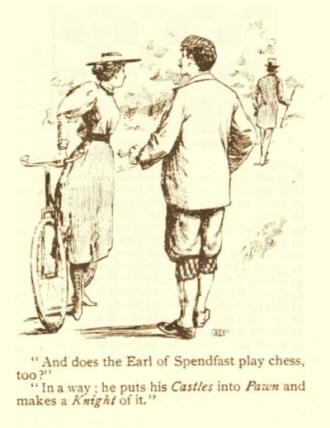
American Chess Magazine, July 1897, page 113
From the Columbia Chess Chronicle, 12 May 1888, page 145:
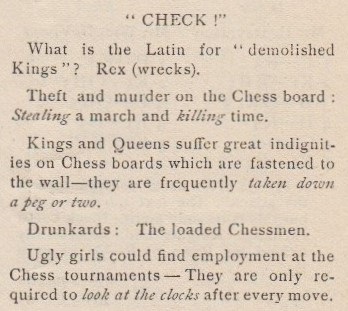
(9719)
From page 22 of a copy of an unidentified twentieth-century scrapbook we have plucked up the courage to make these additions:
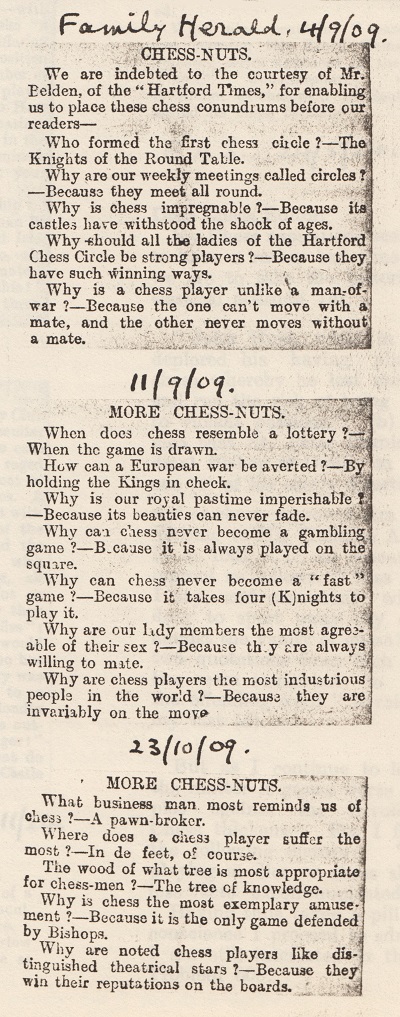
(10048)
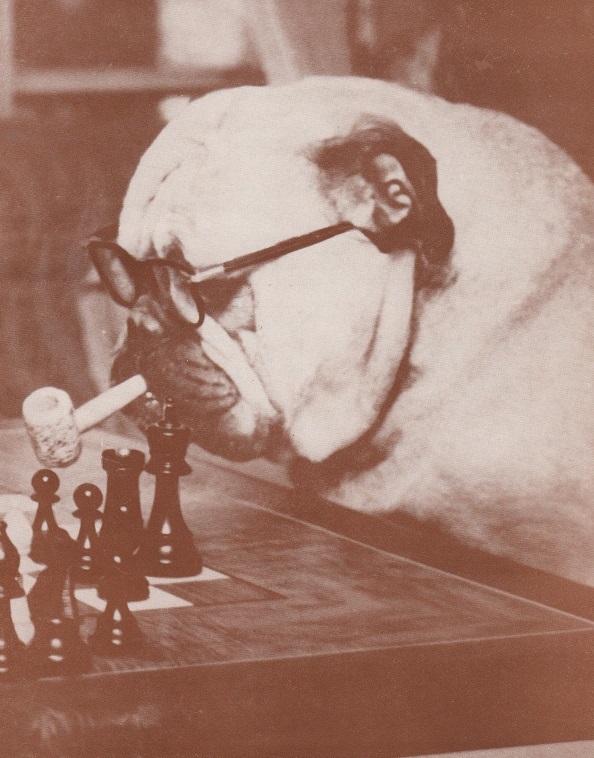
Chess Review, January 1955, front cover
This is the kind of photograph that writers and editors seem incapable of reproducing without a trite pun.
(10456)
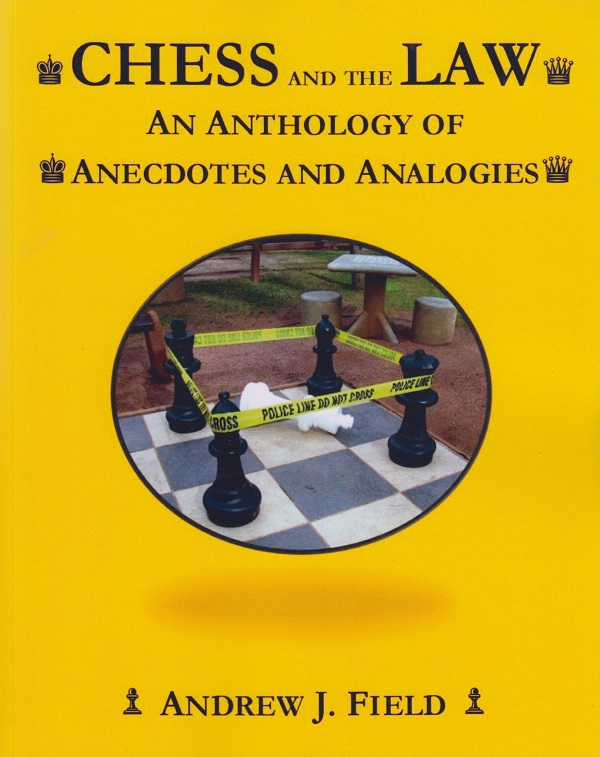
The hundreds of entries in Chess and the Law An Anthology of Anecdotes and Analogies by Andrew J. Field (‘Amazon Fulfillment’, Wrocław, 2019) range from a brief paragraph on a minor court-case to four pages on Norman Tweed Whitaker and nine on William Henry Russ. An unnumbered introductory page states that the book ‘surveys the many interesting and unusual ways that the game of chess has intersected with the practice of law in the United States’ and warns that ‘this book is not appropriate for children’. Many violent cases are discussed.
Among the few light items, there is none lighter than a puzzle-joke on page 162 credited to page 67 of the Nashville Tennessean, 24 November 1966. As that was the column with the (hoary) solution, we show first the previous ‘Scram-lets’ column, on page 32 of the 23 November 1966 edition:
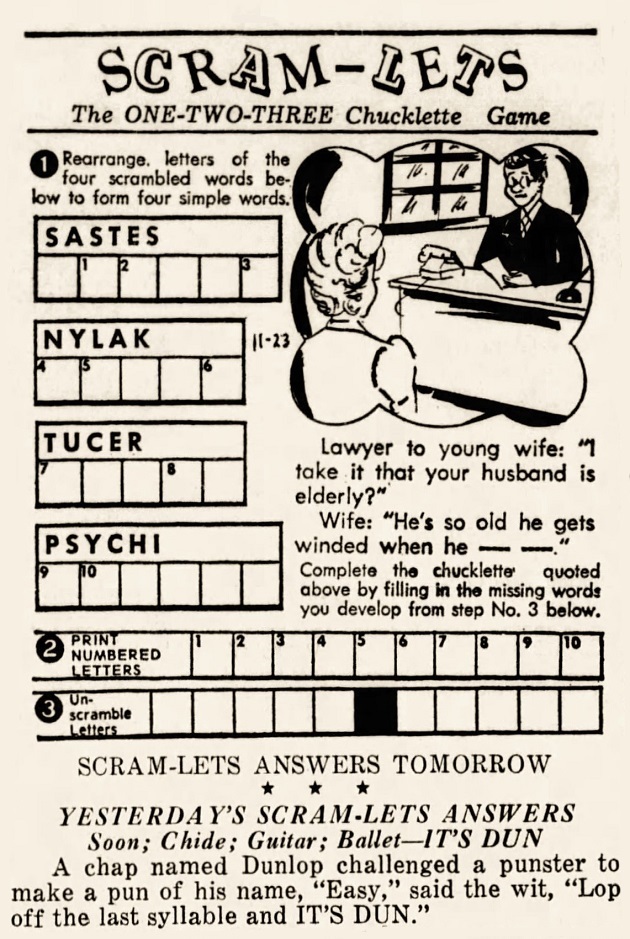
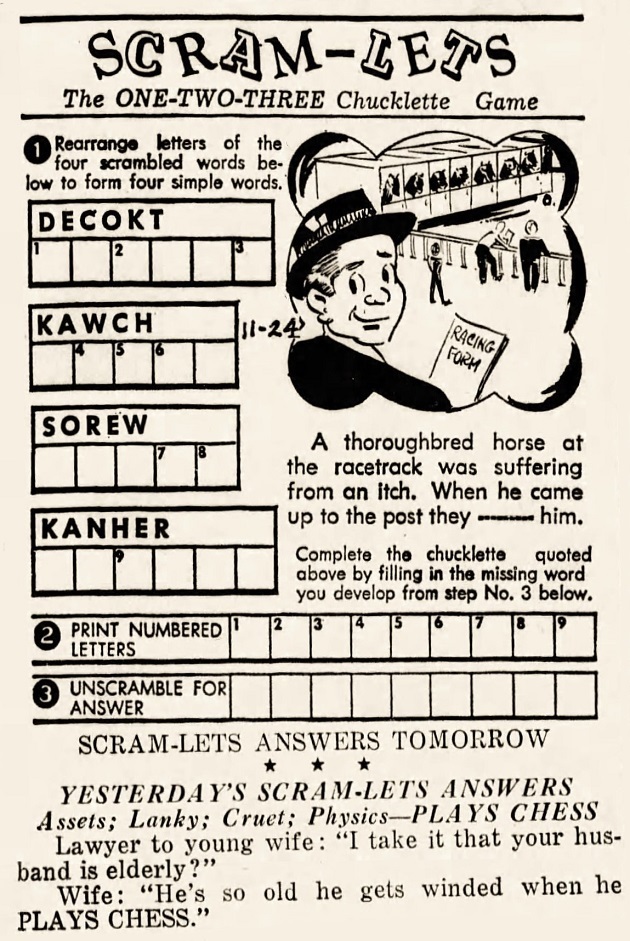
(11681)
Occurrences of the ‘he gets winded when he plays chess’ joke can be found via Google Books in publications of the 1930s.
To the Chess Notes main page.
To the Archives for other feature articles.
Copyright: Edward Winter. All rights reserved.